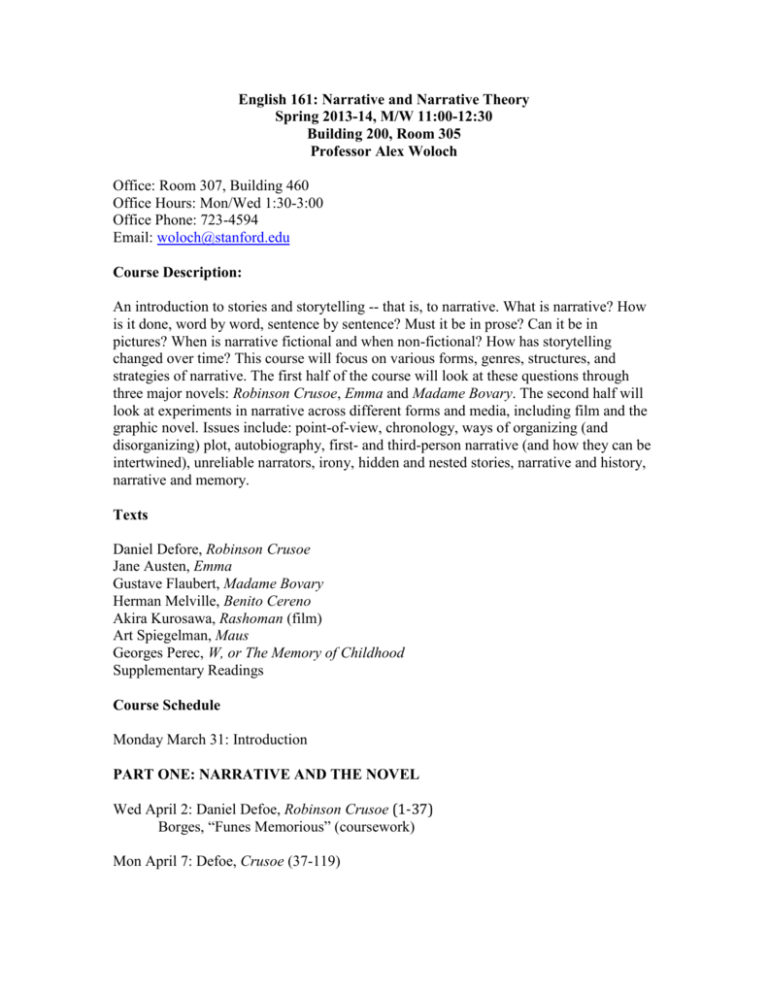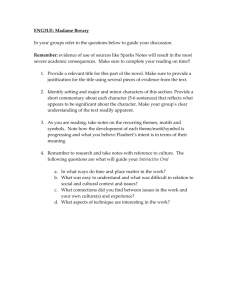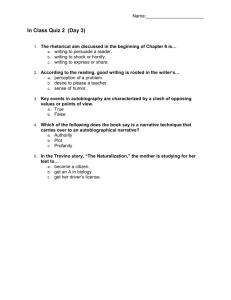Syllabus
advertisement

English 161: Narrative and Narrative Theory Spring 2013-14, M/W 11:00-12:30 Building 200, Room 305 Professor Alex Woloch Office: Room 307, Building 460 Office Hours: Mon/Wed 1:30-3:00 Office Phone: 723-4594 Email: woloch@stanford.edu Course Description: An introduction to stories and storytelling -- that is, to narrative. What is narrative? How is it done, word by word, sentence by sentence? Must it be in prose? Can it be in pictures? When is narrative fictional and when non-fictional? How has storytelling changed over time? This course will focus on various forms, genres, structures, and strategies of narrative. The first half of the course will look at these questions through three major novels: Robinson Crusoe, Emma and Madame Bovary. The second half will look at experiments in narrative across different forms and media, including film and the graphic novel. Issues include: point-of-view, chronology, ways of organizing (and disorganizing) plot, autobiography, first- and third-person narrative (and how they can be intertwined), unreliable narrators, irony, hidden and nested stories, narrative and history, narrative and memory. Texts Daniel Defore, Robinson Crusoe Jane Austen, Emma Gustave Flaubert, Madame Bovary Herman Melville, Benito Cereno Akira Kurosawa, Rashoman (film) Art Spiegelman, Maus Georges Perec, W, or The Memory of Childhood Supplementary Readings Course Schedule Monday March 31: Introduction PART ONE: NARRATIVE AND THE NOVEL Wed April 2: Daniel Defoe, Robinson Crusoe (1-37) Borges, “Funes Memorious” (coursework) Mon April 7: Defoe, Crusoe (37-119) Wed April 9: Defoe, Crusoe (119-end) Monday April 14: NO CLASS, READING DAY Wed April 16: Jane Austen, Emma (Volume One) Monday April 21: Austen, Emma (Volume Two) Wed April 23: Austen, Emma (Volume Three) Mon April 28: Gustave Flaubert, Madame Bovary Wed April 30: Flaubert, Madame Bovary Mon May 5: Flaubert, Madame Bovary Wed May 7: Flaubert, finish PART THREE: FORM AND NARRATIVE EXPERIMENT Mon May 12: Melville, Benito Cereno Wed May 14: Melville, Benito Cereno Amaso Delano, from “Narrative of Voyages and Travels, in the Northern and Southern Hemispheres” Mon May 19: IN-CLASS SCREENING: Kurosawa, Rashoman Wed May 21: Kurosawa, Rashoman Monday May 26: Art Speigelman, Maus 1 Wed May 28: Art Speigelman, Maus 2 Monday June 2 Georges Perec, W, or the Memory of Childhood Wed June 4 W, or the Memory of Childhood Course Requirements 1. Active Reading, Participation and Response. Students are required to attend all lectures and discussions and to complete all reading assignments. In addition, each student should submit one informal reading response for each text. This response is a chance to focus on an aspect of the narrative – a device, a character, an episode, a plot twist, a paragraph, an image, etc. – that’s particularly interesting or striking. The response can raise general questions and issues that emerge out of the text, but should always do this by focusing on a specific passage (or group of passages) that is significant, thoughtprovoking or intriguing to you. 2. Take-home midterm. The midterm will be handed out by May 7 and will be due on May 14. The exam will consist of a 5 page essay on one of the first three texts in the course (Robinson Crusoe, Emma, Madame Bovary). Topics to be provided. 3. Final essay. A final 6-8 page essay focusing on one of the later texts in the course (Benito Cereno, Rashoman, Maus, W) or comparing two texts from the course. Topics to be provided. 4. Final exam. The final exam will have two parts: I.D.s, based on terms from the course, and discussion and analysis of passages. *** Students with Documented Disabilities Students who may need an academic accommodation based on the impact of a disability must initiate the request with the Office of Accessible Education (OAE). Professional staff will evaluate the request with required documentation, recommend reasonable accommodations, and prepare an Accommodation Letter for faculty dated in the current quarter in which the request is being made. Students should contact the OAE as soon as possible since timely notice is needed to coordinate accommodations. The OAE is located at 563 Salvatierra Walk (phone: 723-1066, URL:http://studentaffairs.stanford.edu/oae). Honor Code The Honor Code is the University's statement on academic integrity written by students in 1921. It articulates University expectations of students and faculty in establishing and maintaining the highest standards in academic work: The Honor Code is an undertaking of the students, individually and collectively: 1. that they will not give or receive aid in examinations; that they will not give or receive unpermitted aid in class work, in the preparation of reports, or in any other work that is to be used by the instructor as the basis of grading; 2. that they will do their share and take an active part in seeing to it that others as well as themselves uphold the spirit and letter of the Honor Code. 3. The faculty on its part manifests its confidence in the honor of its students by refraining from proctoring examinations and from taking unusual and unreasonable precautions to prevent the forms of dishonesty mentioned above. The faculty will also avoid, as far as practicable, academic procedures that create temptations to violate the Honor Code. 4. While the faculty alone has the right and obligation to set academic requirements, the students and faculty will work together to establish optimal conditions for honorable academic work.



